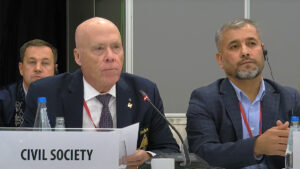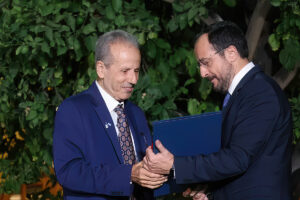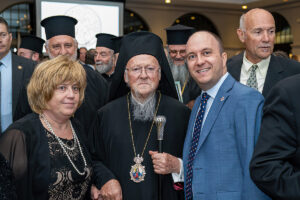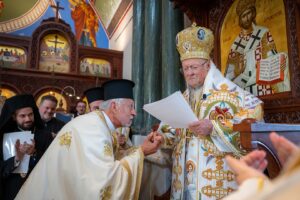His All Holiness Ecumenical Patriarch Bartholomew sent His Eminence Archbishop Irenaios of Crete to represent the Ecumenical Patriarchate at the enthronement of Patriarch Kyrill of Moscow and All Russia on February 1, 2009. Archbishop Irenaios’ remarks, on behalf of the Ecumenical Patriarchate, can be read in their entirety below:
|
|
| His Eminence Archbishop Irenaios of Crete, representing His All Holiness Ecumenical Patriarch Bartholomew, extends greetings to the new Patriarch Kyrill of Moscow and All Russia. (patriarchia.ru) |
Your Beatitude Kyril, Most Holy Patriarch of Moscow and All Russia,
The Ecumenical Patriarchate is present today, with joy and celebration, at the See of the sister Church of Russia in order to participate in the historical moment of the enthronement of Your Beatitude, through our delegation, before an abundant congregation, in the presence of the venerable Hierarchy, “guided by God Himself,” as well as the distinguished and honorable authorities, sacred clergy and pious Russian people. It is present here at the august directive of the All-Holy Archbishop of Constantinople, New Rome and Ecumenical Patriarchate, Bartholomew, and the Holy and Sacred Synod that surrounds him, in order to convey the fervent embrace of the Ecumenical Patriarchate to You, the worthy Patriarch of Moscow and All Russia, as you have already ascended the steps of this historical Throne in succession of the memorable late Patriarch Alexi II, who shepherded the Russian Church over an entire period of eighteen years in a manner that was pleasing to God.
It is with a sense of pride and responsibility that we accepted the weight of this supreme honor to represent the Mother Church here, recognizing the great privilege of representing not only the First Throne of Orthodoxy but also the Mother Church of the Russian people. For, it is a Mother that is proud of the universally acknowledged presence of the daughter Orthodox Church within the inter-Christian and inter-Orthodox world alike. It is also proud of the general presence and assistance of the daughter and sister Church of Russia within the civilized world as well as of its immense contribution to Orthodox monasticism, hagiology, hymnology, art and, more broadly, to the science of Orthodox theology.
It is proper and right, then, to recall this history and defend these truths. In particular, during the difficult times in which we live, when people endeavor to bring about a form of falsification of history and a leveling of values, in an age when a sacrilegious and vain battle is being waged to assume worldly power, it is proper and right to recall the great gifts of the Church to society, its contribution to the godly development of people, the inseparable and loving bond among Churches, as well as the good services of one Church to another.
Thus, on the occasion of this great ecclesiastical and historical moment, while beholding in awe “the brilliant and splendid Church of Christ,” we recall with gratitude to God the historical events, which undoubtedly unite and connect our Church in the Queen of Cities, namely the Ecumenical Patriarchate, with the sister and illustrious daughter Church of Russia.
To begin with, we remember Patriarch Photius of Constantinople, the greatest among ecclesiastical leaders, who inspired the princes of Kiev, through missionary zeal, to espouse Christianity. Indeed, it is historically proven that the first baptisms took place in Constantinople and among those baptized was princess Olga, whose example had a lasting impact on her grandson Vladimir, who established Christianity as the official religion of Russia.
At that time, namely in the year 988, under the rule of prince Vladimir, this newly-founded Church of Russia was placed under the canonical jurisdiction of the Patriarchate of Constantinople, in application of the 28th canon of the Fourth Ecumenical Council. 1
After the fall of Kiev to the Mongols and the ensuing disappearance of Metropolitan Joseph of Russia, possibly to a violent death, the Ecumenical Patriarchate once again stood supportive, suffering with the Russian Church in turmoil. It welcomes the new Metropolitan Kyril II (1243), who was sent to the state of Nicaea in order to receive the canonical confirmation of the Patriarch of Constantinople, who had sought refuge there. And only a few years later, the Ecumenical Patriarchate blesses the decisions of the Synod in the city of Vladimir, transferring the See of the Russian Church to that city by synodical decree. 2
In the fullness of time, the Church of Russia was first proclaimed autocephalous 3 and later elevated to a Patriarchate 4 during the tenure of Patriarch Jeremiah II of Constantinople. Moreover, it is a well-substantiated fact that, when the then Patriarch Joachim of Antioch visited Moscow, he received a relative petition from the then Czar Theodore to elevate the Russian Church to a Patriarchate; nevertheless, being aware of the ecclesiastical order and canonical process, the Patriarch of Antioch confirmed that the establishment of a Patriarchate in Russia presupposed the initiative of the Ecumenical Patriarchate, which was indeed secured, thereby materializing the desire of the Russian people and the Russian Church.
As known, the Patriarchate of Russia was abolished in the year 1701, having experienced difficult crcumstances. However, then too, the Mother Church affectionately and lovingly recognized by synodical decree the troubled Synod of the Russian Church. 5
The Patriarchate of Russia was reconstituted in the year 1917, from that time until now manifesting a splendid development in the Church, culminating in the characteristic historical milestone of the impressive festive Millennial celebrations of Christian life in Russia (1988), with the active participation of God’s people and the formal representation of almost all Christian Churches.
From all that has been said thus far, one ascertains that, with the passing of time, the Patriarchate of Russia has matured and strengthened. And today, the entire Orthodox world takes pride in this, as does the Mother Church of Constantinople. For, through the ages and in the midst of diverse adventures, this Church has offered many Saints to the Church; it has endured, survived, and still lives as it increasingly grows and bears fruit. The expectations of the Constantinopolitan Church are, of course, many; and they are focused particularly on unity, concord, as well as a common journey toward the organization and convocation of the Great Council, which has long been announced and whose preparation must be hastened in order to preserve the credibility of the Orthodox Church, cooperation in conducting theological dialogues with other Christian Churches, as well as a mutual and peaceful solution of occasional bilateral issues that arise and other difficult inter-Church and inter-Orthodox issues, such as result from bioethics and the need for a unified liturgical order, but also of social issues, such as the supremely significant problem of the global economic and moral crisis in the contemporary world.
The vision of the first-throne Church of Constantinople for this common journey are crowned by fine and favorable hopes inasmuch as, upon this historical Throne, there has ascended today an ecclesiastical man, creative and active, tested for his ecclesiastical ethos, recognized for his canonical and theological mind, as well as for his balanced word, his Christ-loving sentiments, his contribution to the question of Christian unity and his spiritual integrity firstly as a human being and consequently as a bishop of the Orthodox Church of Christ.
Your Beatitude,
The ancient and martyric Apostolic and Ecumenical Patriarchate of Constantinople, together with its visionary and wise leader Patriarch Bartholomew, today participate — through us — in this blessed moment of ecclesiastical history and in this joy of the Russian Church, rejoicing and congratulating, while at the same time embracing with a great love that spans from the Bosphorus and the seven hills of the Royal City to the entire church of Russia and You personally.
As evidence of this inexpressible joy and for the sake of festive commemoration, in greeting the venerable Hierarchy, the sacred Clergy, His Excellency the President of Russia Mr. Dmitri Medvedev, His Excellency the Prime Minister of Russia Mr. Vladimir Putin, the honorable authorities, the monastic brotherhoods and the entire plenitude of the Russian Nation, we convey the brotherly and symbolical greeting of His All-Holiness our Ecumenical Patriarch Bartholomew by means of this pastoral rod “that You may shepherd the Flock of Christ entrusted to You,” and we wholeheartedly wish upon Your Holy Beatitude health, many years, a glorious and fruitful Patriarchal tenure, as we proclaim: Kyril, His Beatitude Patriarch of Moscow and All Russia, many years!
Axios!
1. PG Migne 132: 1105. This is why the Metropolitan of Russia was elected and ordained by the Ecumenical Patriarchate, while also periodically participating in the Endemousa Synod. See also PG Migne 137: 489.
2. F. Miklonish and I. Fuller, Acta et Diplomata Graece Medii Aevi, Sacra et Profana, vol. 1, Wien 1860, pp. 351-353.
3. In the year 1448.
4. In the year 1589.
5. G. Rallis and M. Potlis, Syntagma ton Theion kai Ieron Kanonon, vol. 5, Athens 1865 [In Greek], pp. 160-163.







